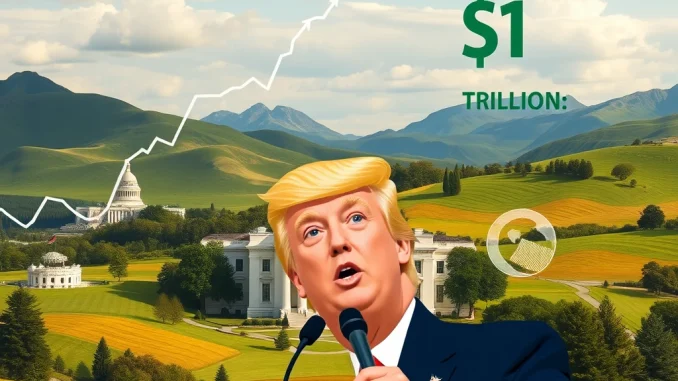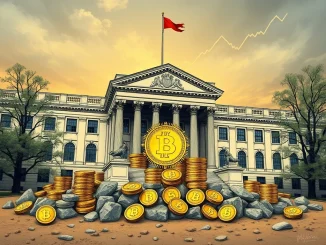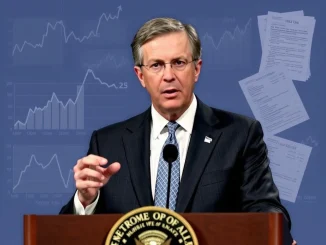
In a significant economic statement, former U.S. President Donald Trump recently asserted that a strategic move on interest rates could unlock massive savings for the nation. Speaking via his Truth Social platform, Trump put forward a specific target for the Federal Reserve, claiming it could dramatically impact the US economy.
Trump’s Proposal: Targeting Interest Rates
What exactly did Trump propose? He suggested that if Federal Reserve Chair Jerome Powell were to lower the benchmark interest rates to a range between 1% and 2%, the United States could see remarkable financial benefits.
Here’s a breakdown of his core argument:
- The Target: Lowering rates significantly from current levels to 1-2%.
- The Benefit: Potential annual savings of up to $1 trillion.
- The Critic: Pointing blame for current economic costs towards the Biden administration.
Saving a Trillion: How Lower Rates Could Impact the US Economy
The idea behind Trump‘s claim is rooted in the cost of servicing the national debt. The U.S. government owes money, and like any borrower, it pays interest rates on that debt. When rates are high, the cost of borrowing and rolling over existing debt increases substantially. Conversely, lower rates reduce these costs.
Consider this simplified view:
| Scenario | Interest Rate Level | Impact on Debt Servicing Costs |
|---|---|---|
| Current Environment | Higher Rates | Increased Costs |
| Trump’s Proposal | 1-2% Rates | Significantly Reduced Costs (Potential Savings up to $1 trillion) |
By lowering rates to his proposed range, Trump argues the government could save an immense amount of money annually that would otherwise be spent on interest payments. This potential saving of $1 trillion is a staggering figure, highlighting the financial leverage tied to the Fed’s monetary policy decisions.
Trump vs. Jerome Powell: A Familiar Standoff
This isn’t the first time Trump has voiced strong opinions regarding Jerome Powell and the Federal Reserve’s handling of interest rates. During his presidency, he frequently urged the Fed to lower rates. His recent comments continue this pattern, directly criticizing Powell and linking the current economic costs he aims to reduce to the policies of the current administration.
Trump‘s focus remains on what he perceives as the unnecessary financial burden imposed by current monetary policy, a burden he attributes to the actions and priorities under President Biden. This creates a clear point of contention between his economic vision and the current stance of the Federal Reserve under Powell.
What Does This Mean for the US Economy?
The debate over interest rates has significant implications for the broader US economy. While lower rates can reduce government borrowing costs, they also have other effects:
- Can stimulate borrowing and investment by businesses and consumers.
- May potentially lead to increased inflation if the economy overheats.
- Impact savings accounts and fixed-income investments, offering lower returns.
- Influence the strength of the U.S. dollar.
Trump‘s focus on the $1 trillion saving highlights one major potential benefit from his perspective, but economists hold varied views on the optimal rate levels and the potential risks and rewards associated with such aggressive cuts.
Conclusion: A Trillion-Dollar Question
Donald Trump‘s recent assertion that lowering interest rates to 1-2% could save the US economy up to $1 trillion annually presents a bold economic proposition. His criticism of Jerome Powell and the current administration underscores a fundamental disagreement on the direction of monetary policy. While the potential savings figure is substantial, the feasibility and broader economic consequences of such a drastic rate cut remain a subject of intense debate among economic experts. The question of how best to manage interest rates for the health of the US economy is a complex one, with billions, or perhaps even a trillion dollars, potentially on the line.



